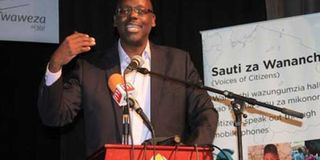Queries as Twaweza press meeting dropped

Twaweza executive director, Aidan Eyakuze.
Dar es Salaam. Regional advocacy organisation, Twaweza, was yesterday forced to cancel a press conference that was aimed at presenting people’s views on media freedom.
This was ahead of today’s commemoration of the United Nations International Day to End Impunity for Crimes against Journalists.
This year’s commemoration is focused on local journalists under the international campaign #KeepTruthAlive.
Activities and events around the world will focus the spotlight on journalists working on corruption and politics in non-conflict situations, which Unesco says represented 93 per cent of journalist deaths in the past 10 years.
Through a Twitter posting yesterday, Twaweza associated the cancellation of its press conference with what it called “reasons outside our control.” No one from the organisation was willing or ready to shed more light on the matter. The announcement caught journalists who had turned up for the meeting by surprise.
But, a source from Twaweza who requested anonymity told The Citizen that the organisation was directed not to go ahead with the press conference.
However, the source declined to state who or which authority gave the orders –and in what form the directive was delivered. According to the source, the organisation did not want to appear antagonistic.
“But the fact that we failed to go ahead with the event tells a lot concerning the shrinking of civic space in the country. I think this accomplishes the mission more effectively than the press conference would have.”
The MISA-Tanzania chairperson, Ms Salome Kitomari described the incident as “extraordinary” – and that it creates the wrong picture that “everything is not okay.”
If anything – says the overall winner of the 2018-Excellence in Journalism Awards – “Twaweza should have stated exactly who stopped the event instead of keeping people in the dark. Incidents like this one deny the citizens important information that would help them make informed decisions,” she told The Citizen.
The incident comes in the wake of the findings by Human Rights Watch and Amnesty International that authorities in Tanzania were using repressive laws to supress press freedom.
Targeting the media, human rights defenders and the opposition, the two organisations noted that violations of human rights have intensified.
The government is yet to comment on the two reports even though Justice and Constitutional Affairs minister, Dr Augustine Mahiga promised to do so.
According to Twaweza’s report which was yeterday launched jointly in Kenya and Uganda, 82 per cent of Tanzanians who were polled think the media is ‘very important,’ while 65 per cent think ‘either rarely or never do the media in the country abuse press freedoms by printing or saying things it knows are not true.
Some 67 per cent of Tanzanians think that the news media should constantly investigate and report on government mistakes and corruption.
Only 33 per cent approves of the statement that too much reporting on negative events like government mistakes and corruption harms the country.
The percentage of Tanzanians approving of a statement that the media should have the right to publish any news and ideas without government control increased from 35 per cent in 2005 to 74 per cent in 2012.
Thereafter, it decreased to 55 per cent in 2014 – and 42 per cent in 2017, to suggest a wane of trust in media by the public.
The report shows that 56 per cent of Tanzanians think it is either rare or never happens that powerful people influence the police to silence journalists in the country.
The other 44 per cent of respondents think the practice happens always, or at least often.
Yesterday’s failure by Twaweza to present their findings on Tanzanians’ views on media freedom comes about a year since the Tanzanian authorities confiscated the passport of the Twaweza executive director, Aidan Eyakuze, on allegations that his citizenship was under investigation.
Mr Eyakuze’s passport was taken from him by the Immigration department four days after Twaweza released an opinion poll indicating that the popularity of President John Magufuli had declined.
He has since been stranded in the country, unable to travel abroad in pursuit of his official and other functions, often holding meetings via teleconference.




